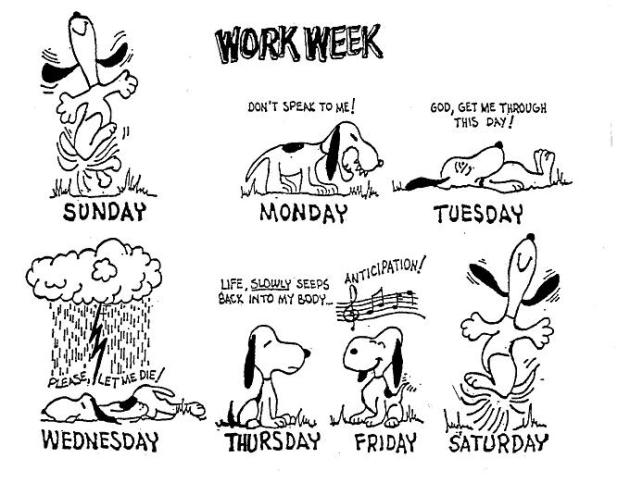Topics
Get In Touch
+52 1 2221 989601
"The essence of the independent mind lies not in what it thinks, but in how it thinks." –Christopher Hitchens
“ Work is what people have to do in order to be able to buy Iphones and party”
This sentence was uttered by one of my middle-school students during a class discussion about what work means to them. Regrettably, she was not an outlier in uttering this opinion, but a representative of the class consensus; and as far as I can tell, society’s consensus also. For quite some time it has been generally accepted that one’s “job” is merely the obligatory, often grueling task that one has to do in order to fund leisure. Do you want to have nice things? Well suck it up and work. Do you want to travel and go to shows and concerts? Well suck it up and work. Indeed , the so-called Monday-Friday workweek is often seen as an oppressive barrier from you and your “real life”. “TGIF”, am I right? This is our modern philosophy of work, and it is prevalent anywhere we look. To take one example, high-school students today are told to choose college majors solely based on the amount of expected income the majors might provide in the future. These students are no longer told to consider qualitative values of choosing a profession, whether the job will allow them to express themselves, whether it would help society, etc. Is this conception of work one that we should have as a society? What have been the consequences of excluding work from our personal identity? How has this happened and how ought we to change it?

Small Is Beautiful by E. F. Schumacher is considered to be a modern classic on alternative economics. It is a wonderfully enlightening book that critiques our underlying economic assumptions and encourages a new perspective on how we can move towards a sustainable economic future. This collection of essays was written in 1973, but its ideas remain as relevant today as on its day of publication. Among the most interesting of the essays is one entitled Buddhist Economics, where he argues that the current philosophy of work in much of today’s society is dissatisfying, confusing, and ultimately unsustainable.
 Schumacher explains that due to the adoption of Keynesian Economics and capitalist economic structures, our conception of work, which had been previously informed mostly by religious traditions, took a turn for the materialistic with the dawn of the Industrial Revolutions in the early 1800s. Modern economic theory reduces work to an activity to acquire monetary wealth, a mere economic utility. The reasoning behind this new philosophy of work was that it was the only way to meet the industrial employment demands of the new economy. If people continued to view work as part of their personal and social identity and not as merely a way to to make money, then they probably wouldn’t have accepted the impersonal, grueling jobs of the industrial era.
Schumacher explains that due to the adoption of Keynesian Economics and capitalist economic structures, our conception of work, which had been previously informed mostly by religious traditions, took a turn for the materialistic with the dawn of the Industrial Revolutions in the early 1800s. Modern economic theory reduces work to an activity to acquire monetary wealth, a mere economic utility. The reasoning behind this new philosophy of work was that it was the only way to meet the industrial employment demands of the new economy. If people continued to view work as part of their personal and social identity and not as merely a way to to make money, then they probably wouldn’t have accepted the impersonal, grueling jobs of the industrial era.
“For at least another hundred years we must pretend to ourselves and to everyone that fair is foul and foul is fair; for foul is useful and fair is not. Avarice and usury and precaution must be our gods for a little longer still. For only they can lead us out of the tunnel of economic necessity into daylight. “
— John Maynard Keynes
From this philosophy stems the desire to avoid work at at all costs, which Schumacher argues has estranged us from finding a fulfillment and purpose in life. He instead encourages us to adopt what he calls a Buddhist Perspective of Human Labor. Which consists of three parts.
1: Work To Develop One’s Faculties
Our work should allow for the full expression of our creative and intellectual capacities. It should not be an obligation, but an exercise of our mental dexterity.
2: Work To Overcome Ego-Centeredness
Schumacher states that according to Buddhist tradition, work is the main way in which we can go outside ourselves and collaborate with others.
3.Work for Necessary Sustenance
The last point of this perspective deals directly with material necessity. Unlike our modern perspective, working for material gains should be only a component of why we work, not our sole aim.
Personally a lot of these ideas seem interestingly reminiscent of Henry David Thoreau, which makes sense considering he took a lot of inspiration from Eastern Philosophy. One could argue that the main message in all of his work is his fierce opposition to the mindless consumerism and materialism of his day. Though fiercely eloquent, Thoreau’s thought always featured the tricky juxtaposition of idealism and practicality, and I think that’s the main challenge we too must wrestle with if we are to continue to re-think our philosophy of work. However, it is clear to me that we must give it a shot.
“… to make a living not merely holiest and honorable, but altogether inviting and glorious; for if getting a living is not so, then living is not”
–Live Without Principle, Henry David Thoreau
Recent Comments